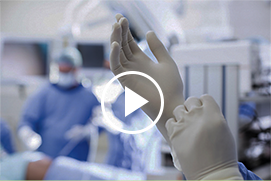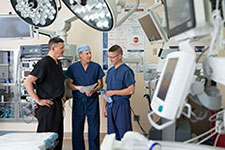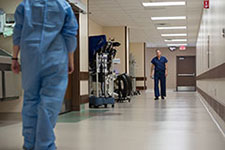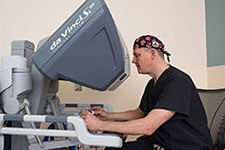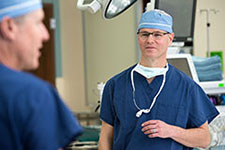You are having surgery to remove part or all of your thyroid. The thyroid is a gland in the front of the neck. It sits just below the voice box. The gland’s main job is to make thyroid hormone. This helps control the body’s metabolism. Thyroid surgery may be done to treat an enlarged thyroid (goiter). Or it may be done to treat a lump (nodule). It may also be done to treat an overactive gland (hyperthyroid). Or it may be done to treat a gland that may have cancer cells.
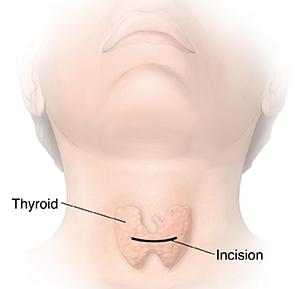 |
| The incision is made at the base of your neck. |
Preparing for surgery
- You may need to stop taking some medications. This includes aspirin. It also includes herbs and other supplements.
- Do not eat or drink anything for 12 hours before the surgery.
During the surgery
- An intravenous line (IV) will be put in your arm or hand. You’ll receive fluids and medications through the IV during the surgery.
- You’ll be given general anesthesia to keep you asleep and free of pain through the surgery.
- An incision is made in your neck, along a crease in your skin.
- Half of the thyroid gland (lobectomy) may be taken out. Or most of the gland (subtotal thyroidectomy) may be taken out. In some cases, all of the gland (total thyroidectomy) is taken out. The doctor may not know how much to take until the surgery.
- The incision is then closed with surgical strips, clips, or stitches (sutures). A drain may be left in the incision. This helps remove fluid that can build up.
Risks and possible complicationsThe risks and possible complications of this procedure include:
|
After the surgery
- It may take a few hours for the anesthesia to wear off. You will get up and walk around soon after the surgery. You will be watched for bleeding.
- You may spend some time staying in the hospital or surgery center after the surgery.
- In most cases, you can eat and drink the evening after the surgery. You may still have nausea from the anesthesia.
- You’ll be given medication to help manage pain, if needed.
- You will be tested to make sure your parathyroid glands are working. The stress of surgery may stop them from working for a short time. If this happens, you may be given calcium pills for a few days.
- You may have a sore throat and a hoarse voice for a week or so after the surgery.



